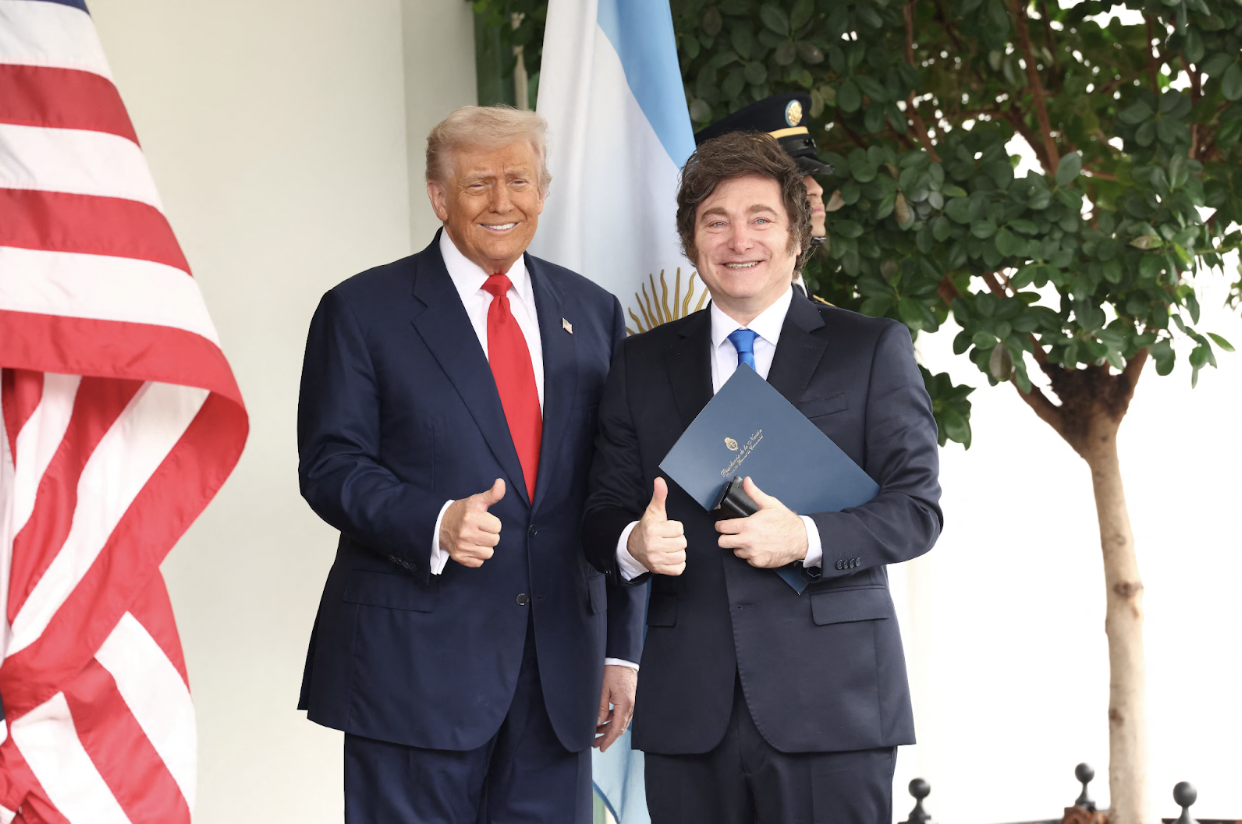Argentine President Javier Milei poses with U.S. President Donald Trump in a photo-op promoting the United States of America’s $40 billion bailout package to Argentina. Photo via Reuters
***
In a move that has sent shockwaves to the American public, U.S. President Donald Trump has agreed to double the bailout package to Argentina’s government from $20 billion to $40 billion. This decision to bail out Argentina was made by the President with coordination from the U.S. Treasury Secretary Scott Bessent and Argentine President Javier Milei to stabilize Argentina’s volatile market. This action comes as Milei’s political party prepares for elections in Argentina, while simultaneously facing an economic crisis as well.
Despite President Trump touting this action as a success, many Americans are outraged by the decision of the U.S. government to intervene in Argentina’s economic affairs. Over 48% of Americans who voted for President Trump in the 2024 election disapprove of his decision to provide financial aid to help stabilize Argentina’s economy, with even infamously conservative Congresswoman Marjorie Taylor Greene going on social media to deride the President on his policy of foreign aid despite campaigning on an “America First” agenda. But the outrage isn’t just within President Trump’s voter base. Caleb Ragland, of the American Soybean Association, has voiced the concerns of many soybean farmers across the country who have not only been hurt by the President’s trade war, but also regarding the soybean industry’s struggle to compete with foreign markets. All of this comes as the United States government continues to experience one of the longest shutdowns in history.
As the debate over the bailout unfolds, it’s essential to understand the underlying motivations behind President Trump’s decision and the broader implications for both Argentina and the U.S. economy. Under Javier Milei’s leadership, the Argentine government has started to enact numerous governmental reforms that reduced wasteful spending and saw the country reach success with inflation going down from 13% to 2%, and the lowest rate of poverty for 7 years straight.
Yet despite this, the Argentine economy continues to weaken, with the country struggling to pay off its $41.8 billion debt to the International Monetary Fund. President Trump’s decision to bailout the country initially involved a $20 million paycheck through collaboration with Wall Street banks with the intention of helping American wealthy investors, but later doubled it to $40 billion after taking Argentina’s October 26th midterm elections into consideration. According to many sources, this decision was also motivated by political concerns, with the U.S. Treasury Secretary Scott Bessent arguing in favor of this action as a means to maintain U.S. influence in Argentina. Trump has even threatened to cut assistance to Argentina if Milei, a political ally of the president, loses the elections, amidst backlash from Argentinian citizens and accusations of imperialism and colonialism.
This decision creates many detrimental effects for the U.S. economy. Many economists and financial experts have noted Argentina’s history of defaulting on its loans, causing unease among many banks on Wall Street that funded the Trump administration’s foreign aid policy. In addition to this, many farmers across the U.S. agricultural industry have voiced their anger over President Trump’s decision to bail out a country that happens to be a major competitor in trade, with many noting that 25% of Argentina’s soybean exports are bought by China. This decision also has many Americans across the country criticizing the deal as shifting priorities away from the country’s own domestic problems in paying its workers and reducing health care costs amidst a government shutdown.
In Argentina, despite the severe backlash from his political opposition, President Javier Milei’s party, La Libertad Avanza, won a landslide victory in the October midterm elections, taking exactly 41% of the vote over the Peronist opposition. Many have seen this as a win for Milei’s agenda, despite concerns of an economic crisis ahead. This is also considered a win for the Trump administration and its cooperation with Argentina, as it seems that both countries will continue diplomatic engagement under mutual interests.
However, whether this engagement will benefit the American people is another question. With heightened concerns on Wall Street, outrage among farmers across the country, and a government shutdown that has continued to harm many Americans by the day, it has become evident that the current administration is failing to put Americans first. The Trump bailout of Argentina is an example of enforcing this idea, and it is important that we pay attention.
***
This article was edited by Emmerson Oskay and Siya Patel.
